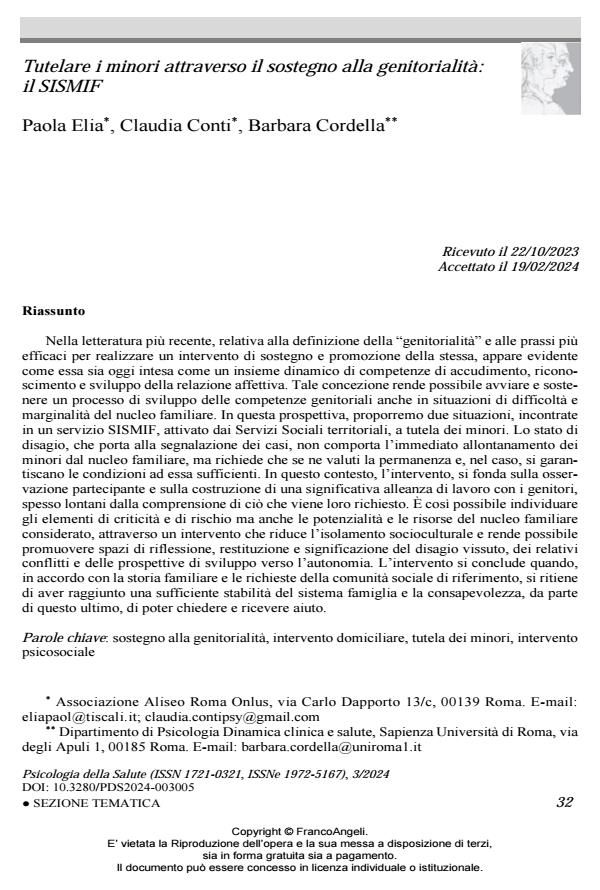Protecting minors through support for parenting: SISMIF
Journal title PSICOLOGIA DELLA SALUTE
Author/s Paola Elia, Claudia Conti, Barbara Cordella
Publishing Year 2024 Issue 2024/3
Language Italian Pages 15 P. 32-46 File size 239 KB
DOI 10.3280/PDS2024-003005
DOI is like a bar code for intellectual property: to have more infomation
click here
Below, you can see the article first page
If you want to buy this article in PDF format, you can do it, following the instructions to buy download credits

FrancoAngeli is member of Publishers International Linking Association, Inc (PILA), a not-for-profit association which run the CrossRef service enabling links to and from online scholarly content.
In the most recent literature on the definition of “parenting” and the most effective practic-es in carrying out a support and promotion intervention, it is evident that today it is understood as a dynamic set of skills of care and recognition and development of the affective relationship. This concept makes it possible to start and support a process of developing parenting skills even in situations of difficulty and marginalization of the family unit. In this perspective, we will propose two situations, encountered in a SISMIF service, activated by the territorial So-cial Services, to protect minors. The state of discomfort, which leads to the reporting of cases, does not involve the immediate removal of children from the family unit, but requires that their stay is evaluated and, if necessary, the conditions for it are guaranteed. In this context, the in-terventions based on participant observation and the construction of a significant working alli-ance with parents, often far from understanding what comes to them. It is thus possible to identify the critical and risk elements but also the potential and resources of the family unit considered, through an intervention that reduces socio-cultural isolation and makes it possible to promote spaces for reflection, return and significance of the hardship experienced, the relat-ed conflicts and the prospects of development towards autonomy. The intervention ends when, in accordance with the family history and the requests of the social community of reference, it is considered to have achieved sufficient stability of the family system and the awareness, on the part of the latter, of being able to ask for and receive help.
Keywords: parenting support, home care services, child welfare, psychosocial intervention
Paola Elia, Claudia Conti, Barbara Cordella, Tutelare i minori attraverso il sostegno alla genitorialità: il SISMIF in "PSICOLOGIA DELLA SALUTE" 3/2024, pp 32-46, DOI: 10.3280/PDS2024-003005